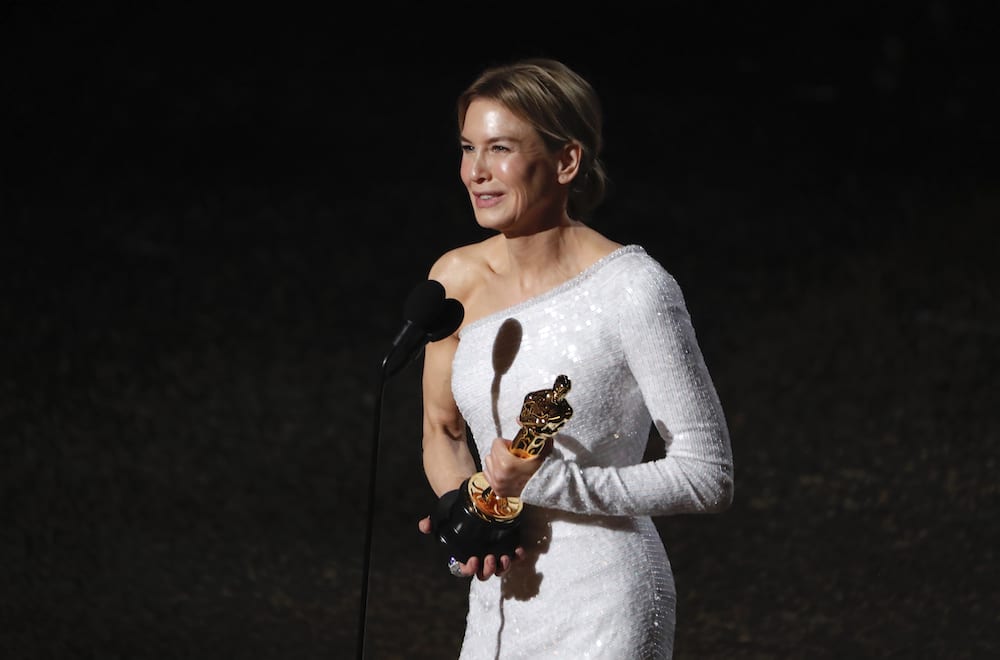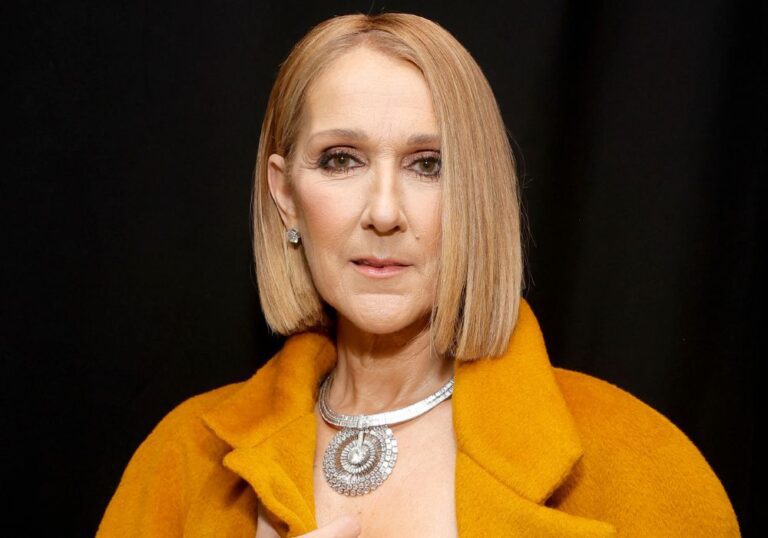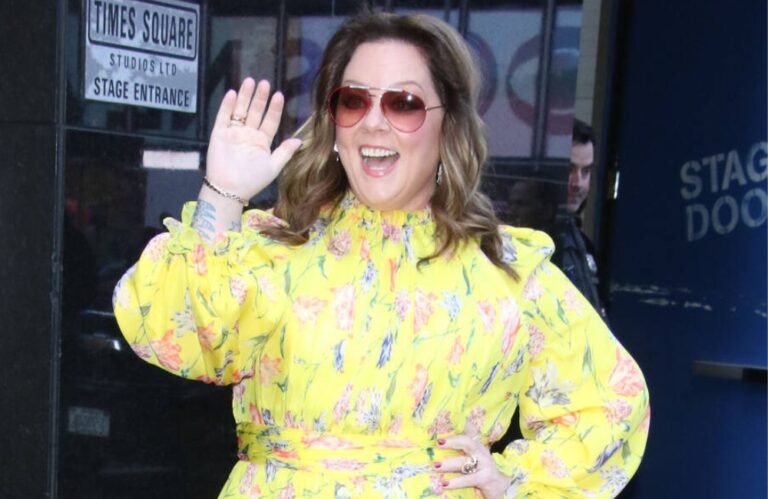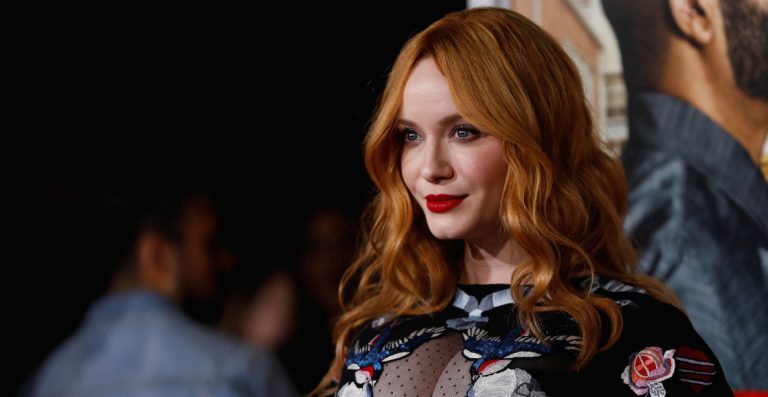It’s mid-July in London, and Renée Zellweger has arrived at a plush Knightsbridge hotel for some advance press for her new movie, Judy. A heart-wrenching biopic about Hollywood legend Judy Garland, it’s still six weeks before the film will be unveiled at the Telluride and Toronto Film Festivals (where it ended up being so rapturously received that Zellweger broke down in tears on stage after a standing ovation – frankly, the least she deserves for a staggering performance).
But today, the 50-year-old Texas native is far too modest to take the acclaim. Still, portraying Judy Garland is surely the role of a lifetime – you’d think it would have left her spent.
“Oh, I don’t know,” she purrs, in her soft southern lilt. “We were all sort of beaten by the end of it. We’re on a bit of a whirlwind schedule. But it was joy, really. Just going every day to see what was possible. See what we could get done. Try to get it all in. Run, run, run!”
Indeed, Judy is not a studio film but a British independent – helmed by acclaimed theatre director Rupert Goold. While beginning with a brief scene in her childhood, with the young Garland on the set of The Wizard of Oz, the story is largely set at the end of her life, when she arrived in London in the winter of 1968 for a series of sell-out performances at the Talk of The Town nightclub. Within a few months, she would be found dead, aged just 47, in her Belgravia bathroom.
At the time Garland took on the residency at the Talk of the Town, she was in dire financial straits, addicted to sleeping pills, wracked by nervous breakdowns and desperate to see her children back home in America.
Nevertheless, Zellweger is full of admiration for her. “She just kept going. She was always hopeful that it was going to be better. She never gave that up,” she says. “The tragedy is that circumstances that were beyond her control led to this situation … this inability to really take care of herself.”
Zellweger says she “had never even considered the possibility” of playing Garland when she was first approached. “I hadn’t thought about it. I hadn’t known about this part of her life in any detail at all. So it was surprising to me to read about it. And I was happy to learn about it … happy for what they were hoping to achieve.”
Certainly, the film should appease Garland’s just-as-iconic daughter Liza Minnelli, who refused to endorse the movie, commenting “I just hope they don’t do what they always do” – meaning an exploitation story.
Growing up in the city of Katy, Zellweger can’t pinpoint exactly when she first encountered Garland’s work. “I can’t tell you, because I don’t ever remember her not being there,” she says. “She just always … she was there. I just took her for granted – she was there. We watched her as Dorothy in The Wizard of Oz every year, when it came on television. It was on one of the five channels you could choose from. And the family got together. Everyone was ready. ‘Hurry, it’s on!’”
Understandably, The Wizard of Oz made a huge impact on the young Zellweger – “It’s a masterpiece,” she says. But nothing could quite prepare Zellweger for the work it would take to transform into Garland. She spent a year preparing, working with dialect coach Liz Himelstein to capture the distinct cadence of Garland’s speech pattern. Archive footage of Garland and Mickey Rooney from when they were teens was watched repeatedly.
Zellweger also took voice lessons with singing coach Eric Vetro, the first time she’d sung professionally since working on 2002’s Oscar-winning film Chicago.
“It was a very different experience, because I didn’t really have liberty to find the style of performance for this character,” she explains – referring to the way Garland’s manner was “pretty well established” to audiences. “I had a lot more work that I needed to do this time. I had to grow a lot, to build a lot, in order to emulate that style – which didn’t come naturally to me.”
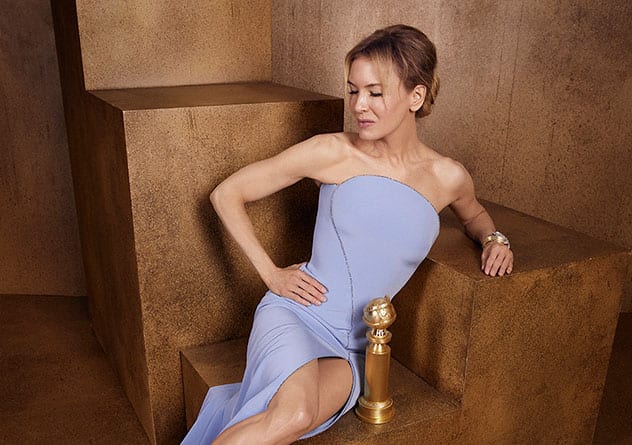
While Zellweger has already been nominated for an Oscar three times – and won for her performance in Cold Mountain – the talk now is of a fourth nomination. Only Scarlett Johansson, quite brilliant in the upcoming Netflix film Marriage Story, seems like a real rival – and as Rami Malek discovered with Bohemian Rhapsody, Hollywood just loves a tragic showbiz biopic. For Zellweger, it would be a triumphant return to the silver screen after briefly stepping off the Hollywood carousel.
In 2010, bored with the roles she was getting, Zellweger went on a much-needed hiatus. “It was necessary. [My career] was not healthy,” she says. “I needed to learn something different, and I needed to grow – and none of those things were going to happen if I was repeating the processes that I’d been revisiting for a decade and a half.”
She eventually returned in 2016 with Bridget Jones’s Baby – the third time she’d played the Helen Fielding-created character.
This hiatus certainly separates her from Garland, who drove herself into the ground – and Zellweger also escaped Garland’s experiences as a child star. Raised by her father, Emil, an electrical engineer; and mother Kjellfrid, a nurse-turned-governess, Zellweger had a relatively normal upbringing. Cheerleader, gymnast, and member of the high school drama and speech clubs, Zellweger was active and creative – but acting wasn’t foremost in her mind. “My English teacher in 10th grade convinced me to be more involved in writing,” she says.
She’d always penned short stories, and when she arrived at the University of Texas to major in English, she had thoughts of becoming a journalist. But after taking a drama course, she acted in a thesis film for a student filmmaker.
“She needed an actress,” Zellweger explains. “The sort of raw, ‘see what we can do with five people and no money’ creative collaboration … I loved it. I loved trying to understand what made this woman [I was playing] tick.”
When she graduated, Zellweger worked as a cocktail waitress in order to support herself while she started auditioning for roles. She won a Coors commercial and gained her Screen Actors Guild card; soon she started getting bit parts in films like Reality Bites and Dazed and Confused. “There’s something kind of wonderful about the fearlessness of those years – because your time is a little less precious,” she reflects. “And once you’ve established that you can take care of yourself in the world, you’re pretty good to go.”
Then in 1996, Zellweger shot to fame as the object of Tom Cruise’s affections in Jerry Maguire. Her star continued to rise in movies like Nurse Betty, which won her a Golden Globe (the first of three) and Bridget Jones’s Diary, where she gained considerable weight to play the titular singleton.
“I’m so spoiled rotten!” she says. “I really am. I’ve worked with some of the most talented, kindest, creative people. Some real originals, y’know?”
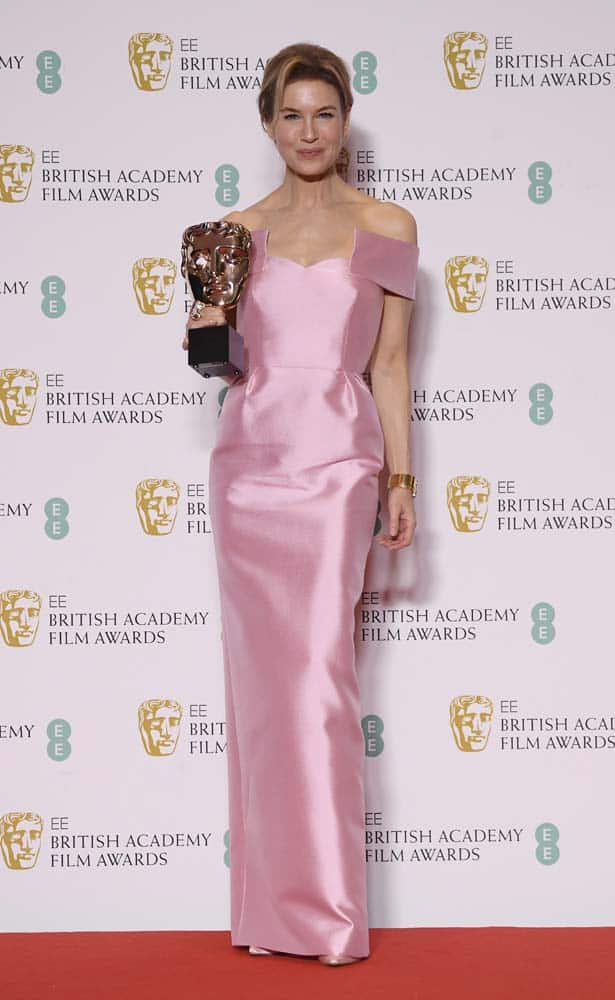
Among her screen partners? Comedian Jim Carrey – on Me, Myself and Irene – to whom she was engaged for a year back in 2000. Zellweger went on to marry singer Kenny Chesney in 2005, but the marriage was annulled after just a few months. More recently she dated musician Doyle Bramhall II, though it’s been Zellweger’s appearance that’s caused the most chatter in
the media. When she returned to the spotlight, gossips mused on whether she’d had cosmetic surgery, something she denies.
While she’s certainly been the subject of rumour and controversy regarding possible plastic surgery, in the era of #MeToo, Zellweger considers herself lucky that she was never subjected to any sexual harassment, or worse. “It’s definitely a pattern that’s been a part of – well, not just this industry, but I think it’s across the board, really. I mean, it’s still happening,” she says.
Has she detected any changes in Hollywood? “Of course. I mean, there are new systems that are put in place – and I’m sure there’s a level of anxiety that is influencing the decisions people make, the things they say. But where it goes … we still have to see.”
Now she’s back, the focus will be on what Zellweger does next. After finishing Judy, she went straight into the Netflix thriller What/If – playing a venture capitalist. But what about another Bridget Jones film? Would she consider it? “That’d be fun. I mean, I love her. She makes me laugh. Every day, when we’re trying to figure out what she’s going to do next. Or what Helen’s written, you know, to try and bring that to life. It’s a treasure.”
Does she think of Bridget as her Dorothy? Like Garland’s Oz character, Bridget is beloved the world over. “How about that?” she says. “I never thought of that, but I see exactly what you mean. That’s a really beautiful thing.”
In the meantime, Zellweger has clearly been re-energised by Judy – finding just the sort of fulfilling role she’s been craving. Is there any way she can crystallise the experience in a few words? “I would say it’s been inspirational.” Perfectly put.


